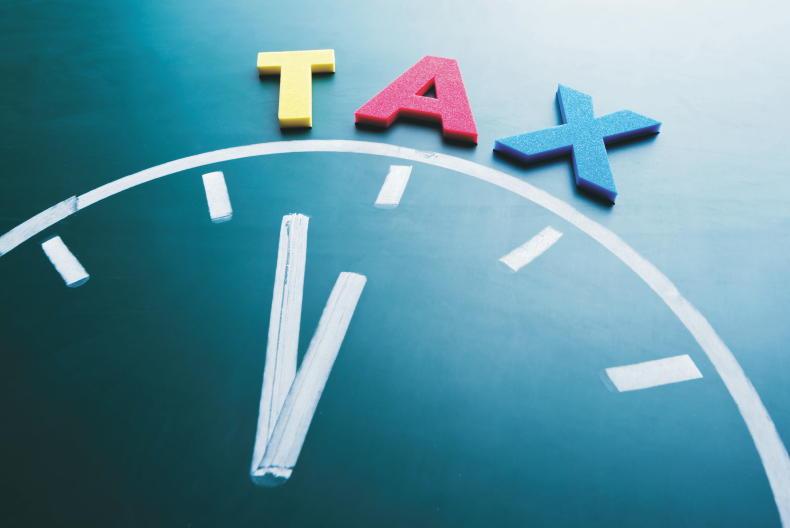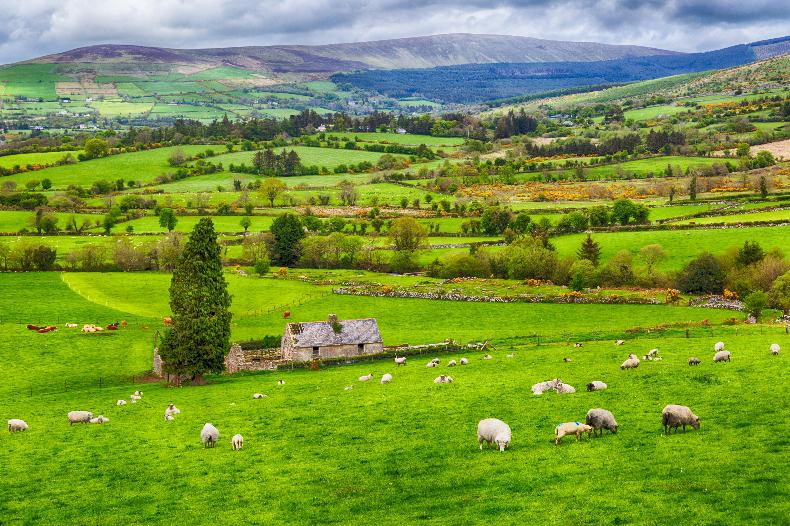My Agricultural Consultants Association (ACA) colleague, Tom Rafter, outlined in his recent article how crucial it is for farmers to have a proper understanding of the figures underpinning their farm business. Ideally, financial accounts should be prepared as soon as possible after the accounting year end, which in many cases is 31 December or 31 March.
The accounts form the basis for income tax computations. They can however often also form the basis for bank loan applications, costs on a per litre/kg comparison, cashflow planning and future budget preparation.
The majority of farmers are self-employed sole traders. They are therefore obliged to submit their 2019 tax return by 31 October 2020 in order to avoid a 5% penalty and interest on late payment of tax. Returns that are more than two months late incur a 10% penalty. Interest on late payment is computed on a daily basis which is approximately 8% per annum. Farm partnerships operate under this regime, but farming companies are subject to corporation tax and CRO filing obligations which are not dealt with in this article.
Deadlines looming
One way or the other, the tax filing deadline for 2019 returns is looming large, with a deadline of 31 October 2020 for paper returns. The deadline is extended to 10 December 2020 (extended by four weeks from 12 November) for taxpayers who pay and file online via the Revenue Online Service (ROS). This extended deadline also applies to CAT, gift and inheritance tax returns that comply with the pay and file requirements. Similarly, the PAYE Form 12 online deadline is extended to 10 December 2020. It is worth noting that a penalty surcharge of 10% is applied to the final income tax liability if the Local Property Tax return or liability are outstanding.
Tax reliefs and collection
Revenue have introduced temporary income tax reliefs for self-employed taxpayers who have been adversely impacted by the COVID-19 restrictions. Self-employed taxpayers can claim to have their 2020 losses and unused capital allowances carried back and used against their 2019 profits, but this is unlikely to be of significance in most farming situations. Of more significance is the option for farmers to step out of income averaging for the 2020 tax year, even if they have stepped out of income averaging in one of the four preceding tax years, but this does not help with the tax situation for the 2019 tax year.
Revenue debt enforcement activity has been suspended until further notice. However, taxpayers are advised to file any outstanding returns even if the taxpayer is not currently in a position to pay the tax liability. It is possible to enter into a Phased Payment Arrangement by agreement with Revenue, if a taxpayer is unable to pay the taxes that are due.
Lending
COVID-19 supports have been a central plank of the government’s strategy. The COVID-19 Credit Guarantee Scheme operated by the SBCI for amounts between €10,000 and €1m for terms of up to five and a half years at an interest rate of 4.5% is available through the main banks such as AIB, Bank of Ireland and Ulster Bank.
There are numerous other variant loans available with differing interest rates and terms and conditions. But the principal message is to manage how your farm is funded and to match the term of the funding to the lifetime of the asset. There is now an opportunity to address any funding mismatch in the current low interest rate environment when low cost capital is being made more freely available.
Priorities at
this time of year
Ensure that your financial accounts are prepared and that your 2019 tax return is submitted before the filing deadline. The balance of 2019 tax should be paid and preliminary tax for 2020, (generally 100% of the 2019 tax amount), should also be paid. Once 2019 is filed, priority turns to preparing 2020 financial data And seeking the preparation of your 2020 financial accounts at the earliest opportunity in early 2021. Anyone considering a farm transfer, partnership, registered farm partnership, succession farm partnership, incorporation or any other significant change to their farming enterprise is also well advised to prepare their financial accounts at the earliest possible opportunity.

Kenneth Hayes is a member of the Agricultural Consultants Association and a Registered Agricultural Consultant. He holds a BAgrSc from UCD, a Certificate in Business & Accounting from CPA Ireland and a Diploma in Tax from the Irish Tax Institute. Tel: 066-7119533 or ken@hayestax.ie
Read more
Your Money: time spent on managing your money is time well spent
Your Money: tax reliefs increase the attractiveness of forestry
My Agricultural Consultants Association (ACA) colleague, Tom Rafter, outlined in his recent article how crucial it is for farmers to have a proper understanding of the figures underpinning their farm business. Ideally, financial accounts should be prepared as soon as possible after the accounting year end, which in many cases is 31 December or 31 March.
The accounts form the basis for income tax computations. They can however often also form the basis for bank loan applications, costs on a per litre/kg comparison, cashflow planning and future budget preparation.
The majority of farmers are self-employed sole traders. They are therefore obliged to submit their 2019 tax return by 31 October 2020 in order to avoid a 5% penalty and interest on late payment of tax. Returns that are more than two months late incur a 10% penalty. Interest on late payment is computed on a daily basis which is approximately 8% per annum. Farm partnerships operate under this regime, but farming companies are subject to corporation tax and CRO filing obligations which are not dealt with in this article.
Deadlines looming
One way or the other, the tax filing deadline for 2019 returns is looming large, with a deadline of 31 October 2020 for paper returns. The deadline is extended to 10 December 2020 (extended by four weeks from 12 November) for taxpayers who pay and file online via the Revenue Online Service (ROS). This extended deadline also applies to CAT, gift and inheritance tax returns that comply with the pay and file requirements. Similarly, the PAYE Form 12 online deadline is extended to 10 December 2020. It is worth noting that a penalty surcharge of 10% is applied to the final income tax liability if the Local Property Tax return or liability are outstanding.
Tax reliefs and collection
Revenue have introduced temporary income tax reliefs for self-employed taxpayers who have been adversely impacted by the COVID-19 restrictions. Self-employed taxpayers can claim to have their 2020 losses and unused capital allowances carried back and used against their 2019 profits, but this is unlikely to be of significance in most farming situations. Of more significance is the option for farmers to step out of income averaging for the 2020 tax year, even if they have stepped out of income averaging in one of the four preceding tax years, but this does not help with the tax situation for the 2019 tax year.
Revenue debt enforcement activity has been suspended until further notice. However, taxpayers are advised to file any outstanding returns even if the taxpayer is not currently in a position to pay the tax liability. It is possible to enter into a Phased Payment Arrangement by agreement with Revenue, if a taxpayer is unable to pay the taxes that are due.
Lending
COVID-19 supports have been a central plank of the government’s strategy. The COVID-19 Credit Guarantee Scheme operated by the SBCI for amounts between €10,000 and €1m for terms of up to five and a half years at an interest rate of 4.5% is available through the main banks such as AIB, Bank of Ireland and Ulster Bank.
There are numerous other variant loans available with differing interest rates and terms and conditions. But the principal message is to manage how your farm is funded and to match the term of the funding to the lifetime of the asset. There is now an opportunity to address any funding mismatch in the current low interest rate environment when low cost capital is being made more freely available.
Priorities at
this time of year
Ensure that your financial accounts are prepared and that your 2019 tax return is submitted before the filing deadline. The balance of 2019 tax should be paid and preliminary tax for 2020, (generally 100% of the 2019 tax amount), should also be paid. Once 2019 is filed, priority turns to preparing 2020 financial data And seeking the preparation of your 2020 financial accounts at the earliest opportunity in early 2021. Anyone considering a farm transfer, partnership, registered farm partnership, succession farm partnership, incorporation or any other significant change to their farming enterprise is also well advised to prepare their financial accounts at the earliest possible opportunity.

Kenneth Hayes is a member of the Agricultural Consultants Association and a Registered Agricultural Consultant. He holds a BAgrSc from UCD, a Certificate in Business & Accounting from CPA Ireland and a Diploma in Tax from the Irish Tax Institute. Tel: 066-7119533 or ken@hayestax.ie
Read more
Your Money: time spent on managing your money is time well spent
Your Money: tax reliefs increase the attractiveness of forestry










SHARING OPTIONS